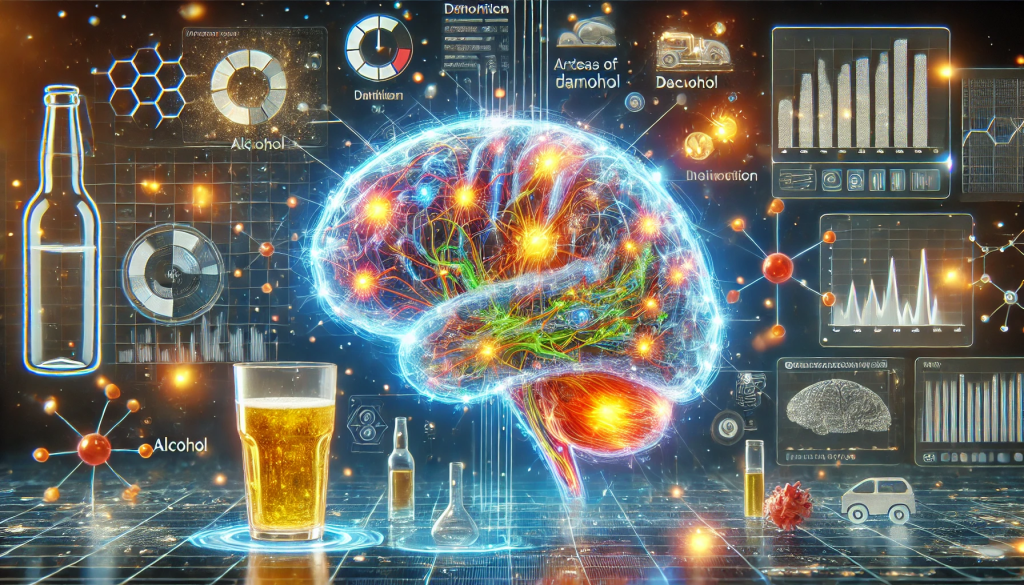Alcohol is widely consumed worldwide and has a significant effect on the human body, particularly the brain. Even moderate alcohol consumption can cause short-term changes, while prolonged and excessive use leads to serious long-term consequences for cognitive functions, emotional health, and brain structure. This article explores how alcohol affects the brain, from short-term effects to chronic conditions.
1. Mechanism of Alcohol’s Action on the Brain
Alcohol is a central nervous system depressant. Once in the bloodstream, it begins to influence neurotransmitters such as gamma-aminobutyric acid (GABA) and glutamate.
- GABA: Alcohol enhances the activity of this inhibitory neurotransmitter, leading to reduced brain activity, relaxation, and sluggishness.
- Glutamate: Alcohol suppresses this excitatory neurotransmitter, slowing cognitive processes and impairing learning ability.
These mechanisms explain why people feel relaxed but lose coordination and clarity of thought after drinking alcohol.
2. Short-Term Effects of Alcohol
Even small amounts of alcohol can cause noticeable changes in brain function:
- Impaired coordination: Alcohol affects the cerebellum, leading to motor and balance issues.
- Reduced concentration: Alcohol’s impact on the frontal lobe results in diminished cognitive abilities.
- Emotional instability: Alcohol affects the limbic system, amplifying feelings of euphoria, irritability, or sadness.
These short-term effects typically dissipate within hours as alcohol is metabolized, but frequent repetition can lead to serious issues.
3. Long-Term Consequences of Alcohol Abuse
Chronic alcohol consumption has devastating effects on the brain, including:
- Brain atrophy: Gradual shrinkage of brain volume, especially in areas responsible for memory and cognition.
- Wernicke-Korsakoff Syndrome: A condition caused by vitamin B1 deficiency linked to chronic alcoholism, characterized by memory loss, confusion, and learning difficulties.
- Emotional deterioration: Chronic alcohol exposure contributes to depression, anxiety, and emotional instability.
Long-term alcohol use is associated with an increased risk of dementia and other neurodegenerative diseases.
4. Alcohol and Cognitive Functions
Chronic alcohol abuse significantly impacts cognitive abilities, including:
- Memory: Alcohol impairs both short-term and long-term memory.
- Decision-making: The brain’s ability to analyze and make decisions is compromised.
- Learning: Alcohol reduces the ability to focus and retain new information.
These cognitive impairments worsen with age, particularly if alcohol abuse begins at a young age.
5. Effect on Neuroplasticity

Neuroplasticity, the brain’s ability to adapt and recover from damage, is inhibited by alcohol. This impedes the brain’s ability to form new neural connections after trauma or stress.
- Alcohol’s impact on neuroplasticity is particularly evident in individuals with long-term use.
- Younger people, who have higher initial neuroplasticity, lose this capacity faster with alcohol abuse.
6. Alcohol and the Adolescent Brain
The adolescent brain is still developing, making it particularly vulnerable to alcohol’s effects. Teenage drinking can lead to:
- Reduced hippocampal volume, critical for memory.
- Impaired learning ability.
- Increased risk of addiction later in life.
Early alcohol consumption has long-term consequences on brain structure and function.
7. Alcohol and Emotional Health
While alcohol may temporarily elevate mood, long-term use is associated with:
- Increased depression and anxiety.
- Impaired emotional regulation.
- Higher suicide risk among those with chronic alcoholism.
These effects result from alcohol’s impact on the limbic system, which governs emotional regulation.
8. Social Aspects of Alcohol Consumption
Alcohol is often consumed in social settings, enhancing feelings of relaxation and belonging. However, alcohol abuse can:
- Lead to aggressive behavior.
- Harm social relationships due to emotional instability.
- Increase the risk of accidents and injuries.
9. Alcohol and Sleep
Alcohol has a dual impact on sleep:
- On one hand, it may help people fall asleep faster due to its sedative effects.
- On the other hand, it disrupts sleep quality by interfering with the REM (rapid eye movement) stage of sleep.
Chronic sleep disruption from alcohol consumption is linked to worsened cognitive function and overall health.
10. Alcohol and Genetics
Genetic predisposition plays a significant role in how the body reacts to alcohol:
- Some individuals have genetic mutations that accelerate or slow down alcohol metabolism.
- Genetics can also determine susceptibility to alcohol addiction.
Research in this area helps explain why some people are more vulnerable to alcohol’s harmful effects.
11. Brain Recovery After Quitting Alcohol

The brain can partially recover after alcohol cessation. Studies show:
- Cognitive functions improve within months of sobriety.
- Brain volume, particularly in the frontal lobe, begins to restore.
- Depression and anxiety levels decrease.
The earlier a person stops drinking, the higher the chances of recovery.
Conclusion
Alcohol affects the brain in both short-term and long-term ways. From impaired coordination to irreversible brain changes, its impact depends on the amount and frequency of consumption. Understanding these risks can help people make more informed decisions about drinking and protect their cognitive and emotional health.

















Pingback: How to Treat Pancreatitis: Therapy Methods and Recommendations - Medhouse.info
Pingback: Journavx (Suzetrigine) - Pain Management without opioid risks -
Pingback: Sugar Is Killing You: The Alarming Truth Backed by Science (And How to Break Free) - Medhouse.info